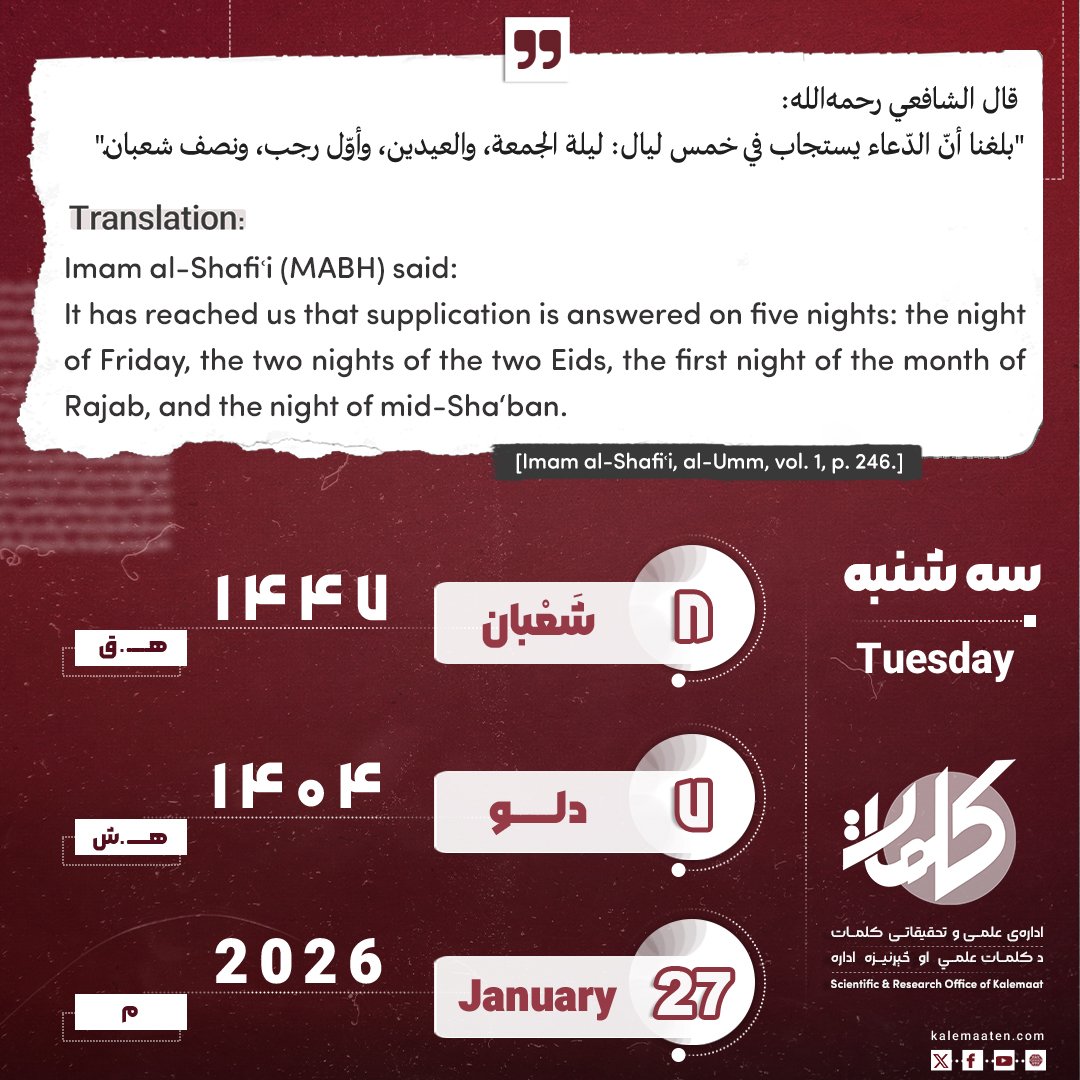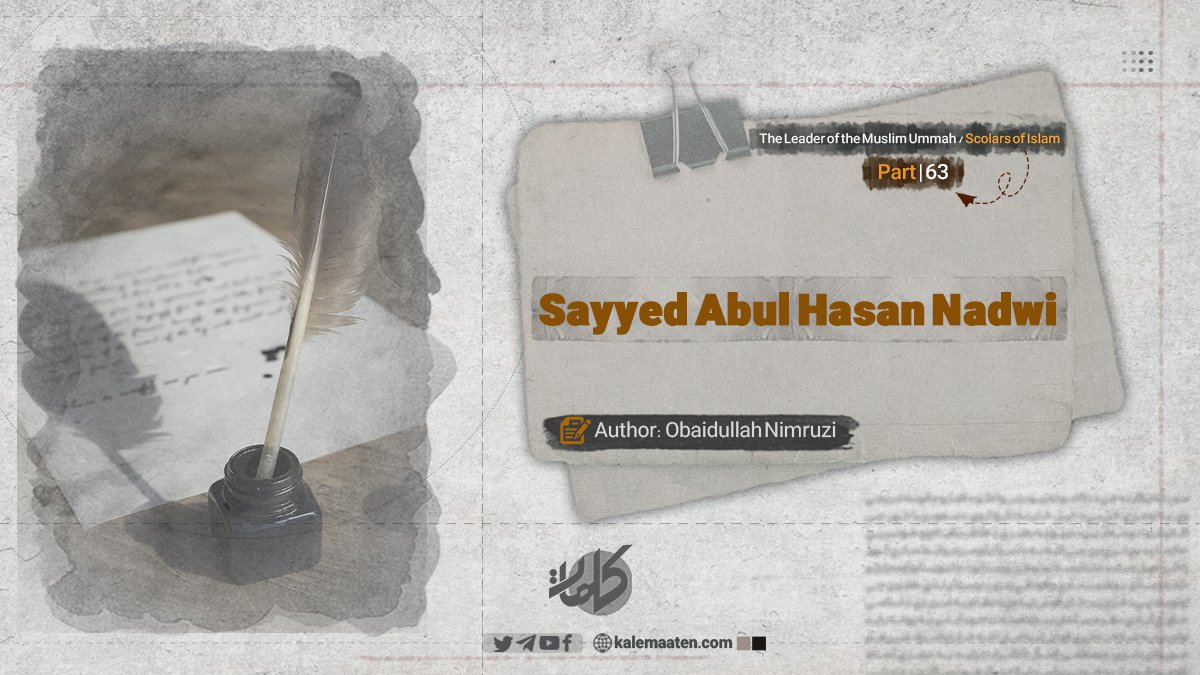Author: Obaidullah Nimruzi
Allama Sayyed Abul Hasan Nadwi ‘May Allah Have Mercy on Him’ (Part 63)
In the Presence of Dr. Muhammad Iqbal, the Enlightened Thinker
Dr. Muhammad Iqbal Lahori was one of the most distinguished, awakened, and compassionate figures of his time. Through his captivating and eloquent poetry and speeches, he kindled the spirit of awakening in people. With a fluent and impactful style, he revealed the realities of the contemporary world, particularly Western culture and European civilization. His poetry could be likened to arrows infused with spirituality and mysticism, striking at the hearts of individuals and igniting an Islamic fervor within them.
Imam Nadwi’s loves for Iqbal stemmed from various motivations, best explained in his own words. Imam Nadwi wrote:
“The greatest factor that made me enamored with Iqbal’s poetry was his ambition, passion, and faith. This beautiful combination was more evident and manifest in Iqbal’s poetry and mission than in the works of his contemporaries. I realized that my own nature was also blended with ambition, passion, and faith, and I felt an irresistible pull toward literature that conveyed a message of ambition, self-confidence, foresight, and a call for the dominance and expansion of Islam—literature that invited humanity to conquer the self and the universe, evoked the fervor of love, emotion, and faith in Allah, and revived the eternal mission of Muhammad Mustafa (PBUH) and his exemplary life.
“Muhammad Iqbal is of great significance to me because he was a visionary poet, a passionate believer, and a man with a distinct ideology and mission. He was the greatest critic and opponent of Western civilization, continuously urging Muslims to reclaim the lost grandeur and sovereignty of Islam. He was the staunchest adversary of nationalism and racial discrimination, and the greatest advocate of humanity and the unity of the Muslim community.”
From childhood, Imam Nadwi was familiar with Dr. Muhammad Iqbal’s poetry and, with his pure soul, grasped the beauty and depth of its meanings. This inspired him to translate some of Iqbal’s poetry into Arabic. In 1929, at the age of sixteen, he had the honor of meeting Iqbal, accompanied by Dr. Abdullah Chughtai. Dr. Muhammad Iqbal warmly welcomed him. Later, on November 22, 1937, Imam Nadwi met Iqbal again, this time when Iqbal was gravely ill. Despite his condition, the two scholars engaged in a three-hour discussion.
Imam Nadwi continuously benefited from Iqbal’s poetry and introduced it to the Arab world. He spoke about Iqbal in various literary and scholarly gatherings and wrote articles on his works. Through his discussions with Iqbal, Imam Nadwi found that their thoughts aligned on many levels. He saw in Iqbal the same pain and concern that an Islamic thinker should feel.
To bring Iqbal’s vision to a wider audience, Imam Nadwi translated his poetry into Arabic and presented it to the Arab world. This endeavor was a literary and intellectual masterpiece, a valuable gift to Islam, Muslims, and especially the Arab world.
Sayyed Sharafat Ali Nadwi wrote:
“Mawlana Nadwi felt that Muhammad Iqbal was not just a messenger of the East but a poet and ambassador of the entire Muslim world. He became convinced that making the Islamic world aware of Iqbal’s status and message was essential.”
Mawlana Nadwi further explained:
“One of the reasons for my deep admiration and devotion to Iqbal was that I was somewhat familiar with the sources and references used by contemporary writers and intellectuals. Despite my young age and limited knowledge, I had studied them to some extent. However, the burning passion and depth of Iqbal’s thoughts were beyond my reach. When I read or listened to his poetry, I felt as though I was traversing a different world. This characteristic is not dependent on mere knowledge and study but originates from a divine and inexhaustible source:
‘This blessing is not attained by mere effort,
Unless bestowed by the Generous Lord.’
In summary, Muhammad Iqbal’s profound poetry had a mesmerizing and spiritually uplifting effect on Imam Nadwi’s mind and soul. Like the words of an impassioned mystic, it refined and elevated his heart and intellect. Nevertheless, Imam Nadwi never blindly followed Iqbal’s thoughts and beliefs. He candidly wrote:
“It is important to clarify that I do not consider Dr. Muhammad Iqbal to be infallible, sacred, or a religious leader and jurist. Unlike many contemporary writers, I do not exaggerate in glorifying him or citing his statements as absolute authority. I believe that the ranks of Hakim Sanai, Fariduddin Attar, and Rumi are far higher than Iqbal’s. They were more committed to the ethics of Sharia and balanced the external and internal dimensions of faith and practice more perfectly. However, I still regard Iqbal as a visionary poet, a passionate lover of truth, and a man of faith.
“I testify that every time I read his poetry, an Islamic enthusiasm surged within me, and my religious emotions and sentiments were awakened. I could hear the resonance of his meanings with my heart’s ear. In my view, the true value of Iqbal’s poetry lies in these very qualities.”
Dr. Muhammad Iqbal Lahori was a devoted, insightful, energetic poet filled with deep concern for the Muslim Ummah. Among those educated in Western institutions, he stood out as one of the most upright and exceptional personalities. He consistently alerted Muslims to the deficiencies, miseries, and brutalities of Western civilization and warned them against blind imitation. He always called Muslims to hold fast to true Islam and displayed an unparalleled love and devotion to Prophet Muhammad Mustafa (PBUH).
Imam Nadwi also made a significant contribution to the critique of Western culture, and without a doubt, Iqbal’s profound thoughts played a role in shaping these perspectives. This intellectual inheritance is clearly reflected in his writings and works.
Iqbal wrote:
“Will the departed song return or not?
Will a breeze from Hijaz arrive or not?
The era of this ascetic life has ended,
Will another knower of secrets come or not?”
Continues…
[1]. The Wonders of Iqbal’s Thought, pp. 10–11.
[2]. A Tribute of Devotion, p. 206.
[3]. The Caravan of Life, vol. 1, p. 175.
[4]. The Wonders of Iqbal’s Thought, pp. 18–19.



